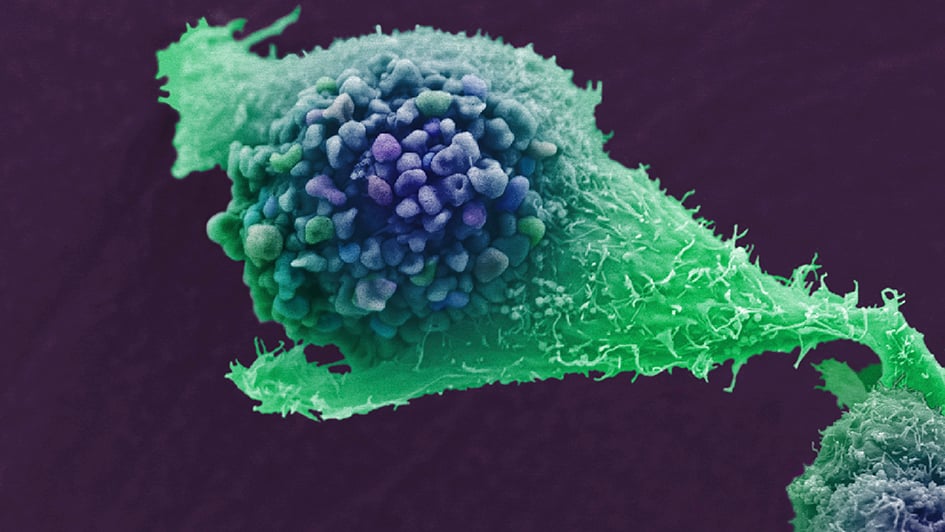
Image: Scanning electron micrograph of a single prostate cancer cell. Credit: Anne Weston, Francis Crick Institute. License: CC BY-NC 4.0
Improving early diagnosis and treatment with regular PSA testing
Following a recent study, our scientists urged that men over 40 with BRCA2 gene faults should get regular PSA screening to detect early signs of prostate cancer.
ICR scientists called for targeted screening after finding that PSA testing picked up prostate cancers more often, at a younger age and in more dangerous forms in men with BRCA2 mutations than in non-carriers.
Professor Ros Eeles, Professor of Oncogenetics at the ICR, who leads the IMPACT study, said:
“Our research shows very clearly that men with the BRCA2 gene fault are at increased risk of aggressive prostate cancer and that regular PSA testing could go some way to improving early diagnosis and treatment.
“We’re now calling on regulatory bodies to update guidance so men with BRCA2 defects can get regular PSA screening.
“Every man over the age of 40 who carries a mutation in the BRCA2 gene should be offered an annual PSA test, as a way of giving men more control over their own health by identifying prostate cancer which is more aggressive and needs treatment.”
Read the story in full
Super responders to immunotherapy
Another study published late last year gave the results of a major clinical trial called KEYNOTE-199. It showed that some men with advanced prostate cancer who have exhausted all other treatment options could live for two years or more on immunotherapy.
The research found that one in 20 men with end-stage prostate cancer responded to the immunotherapy pembrolizumab – but although the number who benefited was small, these patients sometimes gained years of extra life.
Men with mutations in genes involved in DNA repair, like the BRCA genes, had a higher chance of response to pembrolizumab.
The study was published in the Journal of Clinical Oncology.
Professor Johann de Bono, Regius Professor of Cancer Research at The Institute of Cancer Research, London, and Consultant Medical Oncologist at The Royal Marsden NHS Foundation Trust, said:
“Our study has shown that a small proportion of men with very advanced prostate cancer are super responders to immunotherapy and could live for at least two years and possibly considerably longer.
“We found that men with mutations in DNA repair genes respond especially well to immunotherapy, including two of my own patients who have now been on the drug for more than two years. I am now leading a larger-scale trial specifically for this group of patients and am excited to see the results.”
Read the story in full
'The first genetically targeted treatment in prostate cancer'
Late last year, olaparib – a pioneering precision medicine already licensed for breast and ovarian cancer – became the first gene-targeted medicine to show benefits in prostate cancer.
This was according to the results of a new phase II clinical trial, which found that over 80 per cent of men with prostate cancer whose tumours had mutations in the BRCA genes responded well to treatment with olaparib. The research was published in The Lancet Oncology.
Professor Johann de Bono, who also led this study, said:
“Our trial has shown that men with prostate cancer who were selected for faults in DNA repair genes responded very well to the targeted drug olaparib, especially where they had BRCA mutations in their tumours.
“This study and another phase III trial place olaparib on the verge of becoming the first genetically targeted treatment in prostate cancer. I’m excited by these findings, and keen to see further research assessing how we can combine olaparib with other treatments to extend patients’ lives even more dramatically.”
Read the story in full
Reducing the chance of side effects from radiotherapy
Just last month, we shared news about a major clinical trial that aims to side-step side-effects with state-of-the-art radiotherapy.
Two new studies of data from the trial – known as CHHiP, and which has already changed radiotherapy treatment for prostate cancer – showed that changing the way radiotherapy is delivered could significantly reduce the side effects associated with radiotherapy treatment for prostate cancer.
Dr Anna Wilkins, Clinical Research Fellow in the ICR’s Clinical Trials and Statistics Unit, led one of the studies. It showed that reducing radiotherapy doses even further than the doses recommended following the CHHiP trial could still effectively treat cancer, while also lowering the risk of bowel-related side effects.
Dr Wilkins said:
“We are really pleased to be able to show that stricter dose constraints than those used in CHHiP may further reduce bowel symptoms for patients post-radiotherapy.
“Patients who complete treatment for prostate cancer go on to live cancer-free for many years, but may have to live with symptoms caused by treatment which can be difficult to manage and lower quality of life.
“Changing the standards of care to reduce side effects even further, while maximising the effect of treatment, is important.”
Chris, who was diagnosed with prostate cancer in 2016, was advised that surgery might be too risky and instead, a course of radiotherapy was recommended to treat his cancer.
“If there’s a way to deliver radiotherapy with the same success, but without the after effects, this will make a massive difference to the quality of life of many men in the future.”
Read the story in full
Let's finish it: help us revolutionise cancer treatment
Research at the ICR is underpinned by generous contributions from our supporters.
Help us discover a new generation of cancer treatments so smart and targeted, that more patients will defeat their cancer and finish what they started.
Support our work
comments powered by